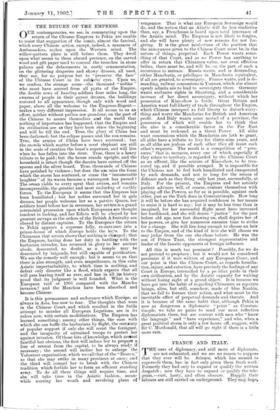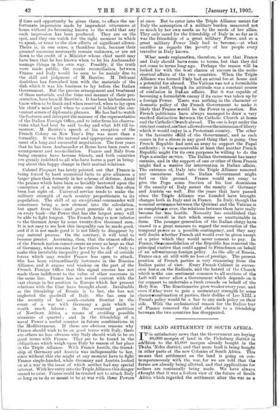FRANCE AND ITALY.
THE uses of diplomacy, and still more of diplomats, are not exhausted, and we see no reason to suppose that they ever will be. Science, which has seemed to supersede them, has in fact only given them fresh work. Formerly they had only to expand or qualify the written despatch ; now they have to expand or qualify the tele- gram,—curt, hasty, and often obscure. Happily their labours are still carried on underground. They maY. *Pe. if time and opportunity be given them, to efface the un- fortunate impression made by imprudent utterances at home without its becoming Imown to the world that any such impression has been produced. They are on the spot, and they can watch for the right moment in which to speak, or trust to the slow effects of significant silence. Theirs is, in one sense, a thankless task., because their greatest successes necessarily remain unknown, or are set down to the credit of a, Minister whose chief merit may have been that he has known when to let his Ambassador manage things in his own way. Possibly, if the truth were made public, the recent reconciliation between France and Italy would be seen to be mainly due to the skill and judgment of M. Barrere. M. Delcass4 doubtless has furnished him with the materials of the dish which it was his business to lay before the Italian Government. But the precise arrangement and treatment of these materials, and the time and manner of their pre- sentation, have been M. Barrere's. It has been his business to know when to be frank and when reserved, when to lay open his chief's mind and when to conceal it behind the con- venient screen of diplomatic phrases. He has had to watch the features and interpret the manner of the representative of the Italian Foreign Office, and to infer from his observa- tions what had best be said to-day and what left till to- morrow. M. Barrere's speech at his reception of the French Colony on New Year's Day was more than a formality. It was the natural and appropriate announce- ment of a long and successful negotiation. The four years that he has been Ambassador at Rome have been years of arrangement and reconciliation. France and Italy from being enemies have become friends, and both countries are greatly indebted to all who have borne a part in bring- ing about this happy change in their mutual relations.
Colonel Picquart has lately pointed out that France is being forced by hard numerical facts to give alliances a larger place than formerly in her scheme of defence. Amid the praises which have been so lavishly bestowed upon the conception of a nation in arms one drawback has often been lost sight of. Universal service tends to make the military strength of each country proportionate to its population. The skill of an exceptional commander will sometimes bring a new element into the calculation, but apart from this—and great generals do not grow on every bush—the Power that has the largest army will be able to fight longest. The French Army is now inferior to the German Army by some twenty-five thousand men. It is not easy to see how this inequality can be made good, and if it is not made good it is not likely to disappear by any natural process. On the contrary, it will tend to become greater. Assuming, then, that the utmost efforts of the French nation cannot create an army as large as that of Germany, what remains for her rulers to do Only to make this inevitable inequality good by the aid of outside forces which may render France less open to attack. She has been extraordinarily fortunate in the Russian Alliance, and it argues real wisdom on the part of the French Foreign Office that this signal success has not made them indifferent to the value of other successes in the same line. France has not rested content with the vast change in her position in Europe which her present relations with the Czar have brought about. Invaluable as the friendship of Russia is to her, she has not neglected the goodwill of Italy. She has seen in the security of her south-eastern frontier in the event of a war with Germany a gain which is worth much labour ; in the eventual partition of Northern Africa a means of avoiding possible occasions of quarrel ; and in the friendship of a naval Power a useful counter in future combinations in the Mediterranean. If these are obvious reasons why France should wish to be on good terms with Italy, there are others no less obvious why Italy should wish to be on. good terms with France. They are to be found in the obligations which weigh upon Italy by reason of her place in the Triple Alliance. With France hostile, the friend- ship of Germany and Austria was indispensable to her, since without this she might at any moment have to fight France single-handed, while Germany and Austria looked on at a war in the issue of which neither had any special interest. With her entry into the Triple Alliance this danger ceased to exist. France could be trusted not to attack Italy so long as to do so meant to be at war with three Powers at once. But to enter into the Triple Alliance meant for Italy the assumption of a military burden measured not so much by her own needs as by the needs of her allies. They only cared for the friendship of Italy in so far as it was the friendship of a. great military Power, and so a. great military Power Italy had to become,—at what, sacrifice as regards the poverty of her people every traveller in Italy knows.
What needs explanation, therefore, is not that France and Italy should have come to terms, but that they did not come to terms long ago. Perhaps the reason will be looked for with the best chance of success in the eccle- siastical affairs of the two countries. When the Triple Alliance was formed Illy had an actual foe at home and a potential foe abroad. The Vatican was not a formidable enemy in itself, though its attitude was a constant source of confusion in Italan affairs. But it was capable of becoming a formidable enemy if its cause was taken up by a foreign Power. There was nothing in the character or domestic policy of the French Government to make it likely that France would be the Power in question. But French politicians have always managed to draw a, very marked distinction between the Catholic Church at home and the Catholic Church abroad. The one is kept under the strictest control, anetnot allowed eventheminimum of liberty which it would enjoy in a Protestant country. The other is the favourite child of the Government, and as such comes in for a share in any good thing that is going. One French Republic had sent an army to support the Papal authority ; it was 'conceivable at least that another French Republic might f Or its own purposes be willing to do the Pope a similar service. The Italian Government has many enemies, and in the support of one or other of them France might find a. motive for intervention in Italian affairs... The entrance of Italy into the Triple Alliance removed any uneasiness that the Italian Government might feel on this ground. France would not essay to give the Pope. some fraction of his lost dominions if the enmity/ of Italy meant the enmity of Germany- and. Austria 'as well. But the years that have passed since the Triple Alliance was founded have brought changes both in Italy and in France. In Italy, though the nominal severance between the Quirinal and the Vatican is as completedne ever, the relations between them have really become far liess hostile. Necessity has established that males vivevei in fact which seems so unattainable in form. The younger generation of the Italian clergy have ceased in a great measure to regard the restoration of the temporal power as a possible contingency, and they may well doubt whether French aid would ever be given except at a price which they would never consent to pay. In France, the consolidation of the Republic has removed the principal motive that could appeal to Frenchmen on behalf of an adventurous foreign policy. As the ally of Russia, France caa sit still with no loss of prestige. The present position of French parties is very reassuring from the. Italian point of view. Every French Cabinet in succes- sion lea' is on the Radicals, and the hatred of the Church which is the one sentiment common to all sections of the Left will never allow a Government which depends on it for support to undertake a fresh crusade on behalf of the Holy See. The Reactionaries grow weaker every year, and even if they were to gain a momentary strength by some chanceicombination of parties, their dislike of Leo XIII.'s French policy would be a bar to any such policy on their side. With the ecclesiastical reason for the Italian fear of Fiance removed the chief obstacle to a friendship between the two countries has disappeared.







































 Previous page
Previous page